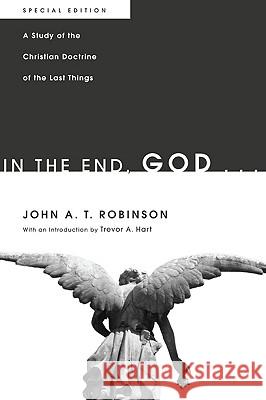In the End, God . . . » książka
In the End, God . . .
ISBN-13: 9781608999835 / Angielski / Miękka / 2011 / 208 str.
Description: ""Eschatology is the explication of what must be true of the end, both of history and of the individual, if God is to be the God of the biblical faith. All eschatological statements can finally be reduced to, and their validity tested by, sentences beginning: 'In the end, God . . .'"" J. A. T. Robinson The God revealed in Israel's story is the Lord of history--a God with good purposes for his creation and a God capable of bringing those purposes to pass. All biblical eschatology arises from this fundamental theological insight. If God is this God then what shape must the future have? John A. T. Robinson explores biblical eschatology with an eye both to the text and to contemporary culture. Revealing the foundation of eschatology to be the experience of God by the community of faith, he calls readers to embrace the eschatological vision of the Bible, but to do so in a way that is alert to its mythic character. In the course of these explorations Robinson also lays bare his own theology of universal salvation. But, contrary to what one may expect, this universalism is one that seeks to take both human freedom and the reality of hell with the utmost seriousness. This special edition of John A. T. Robinson's classic text also includes a debate between Robinson and Thomas F. Torrance (played out across three articles from the Scottish Journal of Theology in 1949), an extended introduction by Professor Trevor Hart (University of St Andrews, Scotland), and a foreword by Gregory MacDonald (author of The Evangelical Universalist). Endorsements: ""A stimulating theological reading of Scripture that puts the doctrine of God at the heart of eschatology. Robinson's little classic, whilst not without its faults, still deserves serious consideration."" --GREGORY MACDONALD author of The Evangelical Universalist ""Of all Bishop Robinson's writings, few, if any, are more enduring and timely than this clear articulation of the contours and christo-logic of soteriological universalism. A very fine introduction and profitable appendices also help to clarify what Robinson was, and was not, championing."" --JASON GORONCY Lecturer and Dean of Studies, Knox Centre for Ministry and Leadership, New Zealand











